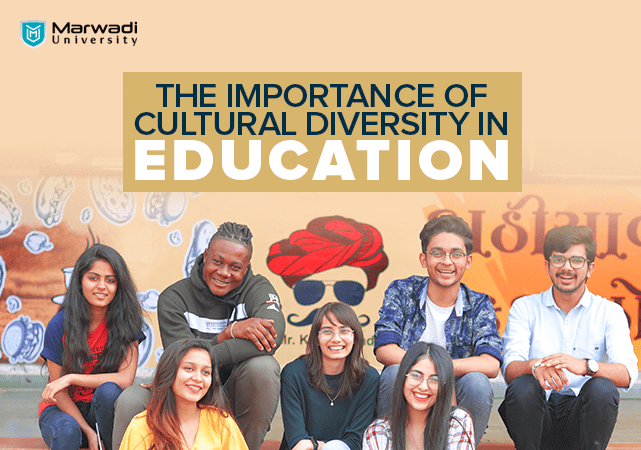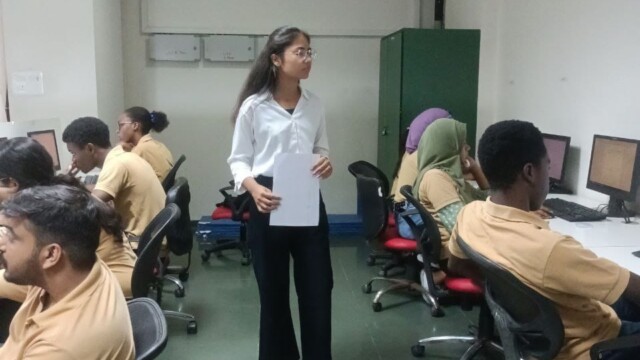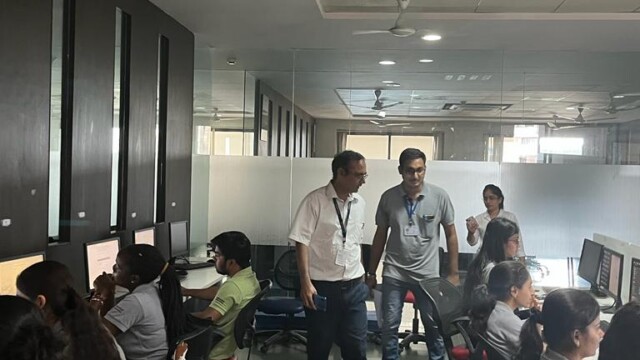“No culture can live if it attempts to be exclusive”– MK Gandhi.
Our world is a diverse place full of different people, their cultures, religion, values, and more. And throughout history, we have come together by embracing our differences instead of renouncing them. Education is the very thing that can help us with it and make the world a better place to live in for every individual.
In order to promote cultural diversity among students, Marwadi University has taken a big step for it. With the International Affairs at MU, we have successfully unified cultures into education at the university level!
Let us dive a bit deeper into the importance and need for cultural diversity in education!
The Importance of Encouraging Diversity in Universities & Workplaces
Diversity in universities and workplaces is important for several reasons. Firstly, it brings in a wide range of perspectives, experiences, and skills which leads to innovative solutions and better decision-making. Secondly, it promotes a culture of inclusiveness and respect, where individuals feel valued and supported.
Moreover, a diverse workforce helps in appealing to a wider customer base, which is crucial for success in today’s global economy. Finally, encouraging diversity and eliminating biases ensures equal opportunities and access to education and employment, helping to address systemic issues such as prejudice and discrimination.
In practical life, diversity can have significant impacts on both individuals and organizations. For individuals, working and learning in diverse environments can help to broaden their perspectives and foster personal growth. For organizations, diversity can lead to improved performance, increased competitiveness, and a stronger reputation.
To conclude, promoting diversity in universities and workplaces is crucial for creating a fair and just society and for driving innovation, growth, and success.
Ways to Manage Diversity in the Classroom
Here are some practical ways to boost and manage cultural diversity in the university:
- Encourage active engagement from all students.
- Foster a respectful and inclusive environment by having zero tolerance for discrimination and harassment.
- Promote equal opportunities and celebrate differences in backgrounds, cultures, and perspectives.
- Encourage diversity in course materials and teaching methods.
- Create opportunities for students to interact with people from diverse backgrounds.
- Build open and active communication between students, faculty, and staff.
- Motivate student-led initiatives and events that celebrate diversity.
- Provide training and resources to help people understand the impact of their words and actions.
Benefits of Cultural Diversity
Cultural diversity in universities brings a multitude of benefits, including exposure to different perspectives, fostering cross-cultural understanding and communication, promoting creativity and innovation, and preparing students for a globally interconnected world.
A diverse student body creates a dynamic and inclusive environment, where individuals learn from one another, challenge their own beliefs, and grow both personally and academically.
In addition, universities with diverse student populations are better equipped to address global issues and create solutions that reflect the needs of diverse communities. Cultural diversity also enhances the reputation of a university and attracts top talent from around the world!
How Does Marwadi University Promote Multiculturalism in University?
Marwadi University’s mission is to be a major centre of academic and research excellence in India and around the world, as we think we live in the age of globalization. Internationalization has been identified as one of the most essential strategic objectives for institutional development at Marwadi University.
International academic cooperation is one of the techniques used at MU to best fulfil the above-mentioned goal of global convergence of knowledge, skills, and culture. Furthermore, international cooperation enhances MU’s public image and visibility within the global academic scientific community, as well as its visibility in the global education market. International Academic Cooperation is also a way for MU to improve and develop an international climate on campus, promoting personal growth, tolerance, and knowledge of global responsibility among university stakeholders!
All this is possible with Student Exchange Programmes with around 24 international educational institutes across numerous courses!
Hopefully, this blog painted a picture of the importance of multiculturalism in education. It is not only for the betterment of the students but also for society wholly.
















 International Airport
International Airport  Railway Station
Railway Station  GSRTC Bus Port
GSRTC Bus Port 


